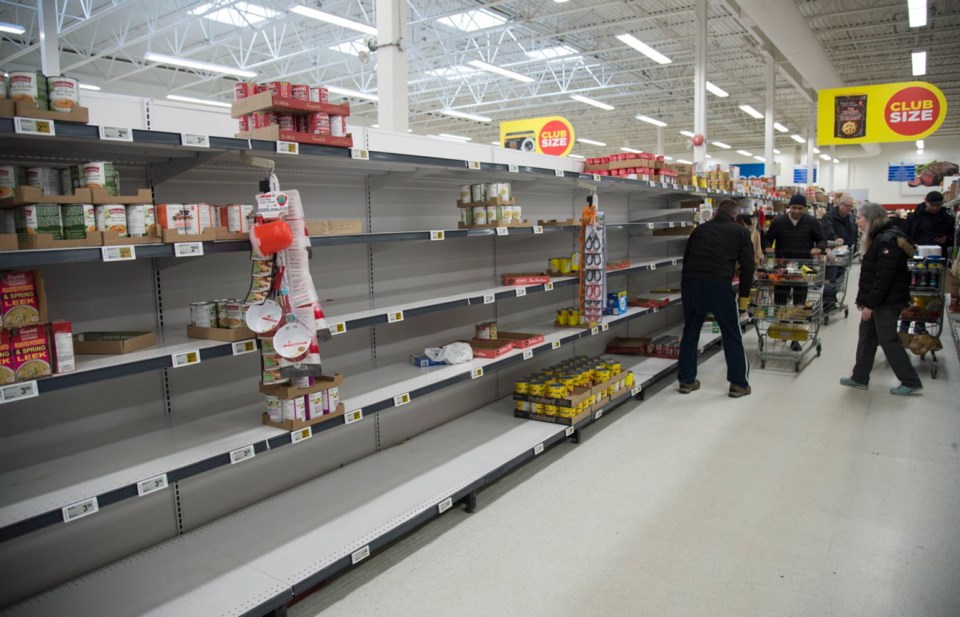At most of the decision points so far in the crisis, governments started in the relatively moderate range of options. Every time they did that, they adjusted to the extreme level quite quickly.
Travel advisories turned into an almost complete shutdown of overseas travel.
The overseas travel ban that didn’t apply to the U.S. was changed to include the U.S. border in a matter of days.
Advisories to self-quarantine if returning from China and Iran turned into self-quarantine directives to every Canadian coming home from anywhere. Then it was made mandatory.
A cruise-ship travel advisory turned into an urgent warning, then a shutdown of cruise-ship arrivals.
Large crowd gatherings were discouraged, then limited to 250, then a few days later limited to 50.
Then all liquor primary licence establishments that can’t keep patrons two metres away from each other were closed.
The declaration of a public health emergency became a full-scale provincial emergency in just 24 hours.
Each move was made as the infection count increased daily. It climbed through the double figures and into the triple figures, to the current total of 231.
The first several official updates about COVID-19 included the phrase: “We want to reassure people that the risk of this virus spreading within B.C. remains low at this time.”
That line was dropped about two weeks ago.
The emergency declaration on Wednesday moves all the decisions that lie ahead to a new level of urgency.
It’s the third time in four years such a move has been made. The first two were about wildfires and weren’t as publicly obvious.
Public Safety Minister Mike Farnworth said the declaration will back up provincial health officials such as Dr. Bonnie Henry and he stressed at the outset that the additional powers apply anywhere, “particularly in areas such as supply chains, for example.”
He also stressed that supply chains for essential products such as food are in good shape.
Governments across the country have consulted with national retailers and are confirming production and distribution is robust. One national grocer said it is experiencing the highest level of customers in its 113-year history.
“People need to use common sense,” Farnworth said. “Many stores and chains are now putting in place limits in response to what has been seen, and we are encouraged by that.”
Farnworth was circumspect about how emergency powers will apply to the supply chain, but left the clear impression the government will impose limits on shoppers if store limits don’t produce the right effect.
Rationing — to use the word he was avoiding.
It’s dismaying to think that the absurd, unwarranted toilet paper rush could lead to that. But if it does, it will likely ease some of the anxiety.
For all the sweeping new authority to coerce behaviour, Farnworth said every provincial emergency brings people stepping up and coming forward to help.
“I do not believe that I’m going to have to use a power to force people to do what they instinctively know is the right thing to do.”
Asked about price gouging, Farnworth said: “There is no place for anybody, either individuals or retailers, taking advantage of what is an unprecedented health situation.”
Hoarding or price gouging has the potential to hurt people, he said.
He noted the law under which the declaration is made prohibits profiteering on necessary supplies such as medical products.
Emergency declarations usually just clear bureaucratic obstacles and trigger various funding mechanisms. They don’t normally take direct effect on people. Given the pattern above, this one might be different.
Here’s a selection of other powers that are now in effect.
• No officials or volunteers responding to the emergency can be held liable for anything they do in good faith;
• Anyone asked to assist by a recognized official must comply, and can’t be terminated from their employment for doing so;
• Authorities can control or prohibit travel to or from any area in B.C, and enter any property without a warrant in the course of implementing emergency programs;
• Officials can “procure, fix prices for or ration food, clothing, fuel, equipment, medical supplies or other essential supplies.”



